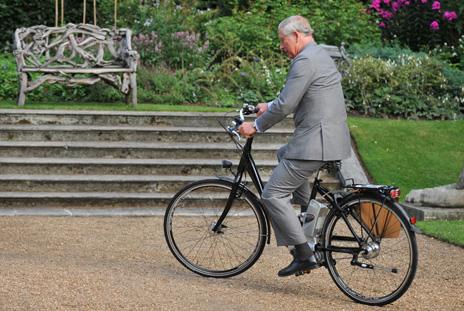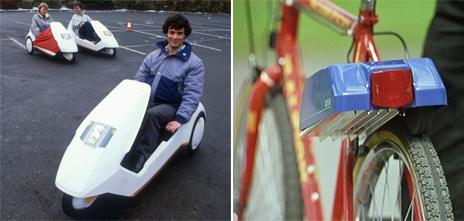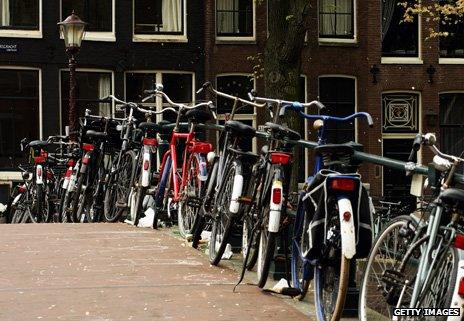Electric bikes: For people who don't cycle?
- Published
Duncan Walker test drives an electric bike
Electric bikes are a common sight in cities from Berlin to Beijing, so why have they failed to catch on in the UK?
Their heads turning to spot what sounds like a milk float drawing up, the eyes of fellow cyclists fall instead on a souped-up pedal bike.
Apart from the electric whine of the motor, there are also the lights of a control panel and a bulky battery behind the seat to set it apart from other bicycles.
Anyone who has failed to spot the differences quickly does so when the cumbersome-looking steed I'm riding leaves all but the most determined lycra-clad cyclist standing at the traffic lights. Doing so is even easier on hills.
It is an electric bike and reactions of those who encounter it vary from mild intrigue, to exclamations of "that's really cool" and an emphatic "that's cheating".
Millions have been sold in China and the machines are popular in parts of continental Europe - selling about 300,000 a year in Germany and 175,000 in the Netherlands. In the UK sales stand at about 20,000.
But with more people than ever taking to two wheels and plans to make electric bikes available to rent in London, could they be the bikes to persuade non-cyclists to get pedalling?
Anne-Laure Espie, a French physiotherapist working in London, uses an electric bike to commute to her clinic and between appointments. She cycles up to 20 miles a day.
"I think that it's less dangerous than a scooter... and it's difficult to know where you park your scooter," she says.
"It just allows you to be quite quick and you still do a little bit of exercise."
In many ways Anne-Laure is a typical owner, says Dermott McBride of E-Bikes Direct.
"Riders include everyone from commuters who want to get to work without arriving soaked in sweat, to people with a slightly dodgy knee," he says.
"At the top end you also have people who buy the high-power mountain bikes for a bit of fun in the city, or out in the countryside."

One may not want to get sweaty pedalling up hills
Electric bikes come in many shapes and sizes, with prices starting at about £500 and rising to £2,000 or more.
You have to be pedalling for the motor to run and, by law, it cuts out at 15 mph (25km/h). Getting the heavier models to go much faster is not easy, but in a city that's a perfectly reasonable speed - although it can mean the more traditional cyclists left at the lights quickly catch up on the flat.
There's no licence to worry about, no insurance, and instead of trips to the petrol pump, the battery - which lasts for about 20 miles - is charged from a power socket.
So why do electric bikes remain something of a novelty?
Among those who will not be buying one in a hurry is Cycling Plus editor Rob Spedding, a self-confessed middle-aged man in lycra. For enthusiasts like him, the point is pedalling hard and getting fit.
"For us, an electric bike is cheating, isn't it? If we wanted to go up Alpe d'Huez [in the French Alps] under power we could drive up it. We want to get there under our own steam."

Inventor Clive Sinclair devised the C5 from 1985, and a powered bike in 1994
But Spedding says that to judge electric bikes on these terms alone is wrong.
"It's a really good entry point into cycling," he says.
As electric bikes still have to be pedalled, an element of exercise is unavoidable - even if hills are less daunting, says Spedding. And encouraging more people onto bikes of whatever kind reduces pollution and congestion on the roads.
But to see electric bike sales rise substantially, cycling needs to become "normal", with safe routes and less of an "us and them" relationship with other road users, he argues.
"I think more than anything it is a culture thing. Britain still isn't a cycling nation and we still don't have the infrastructure - we don't have the nice wide car free cycle paths that some continental European places have."

Electric bikes are making in-roads in cycling city Amsterdam...
In countries such as Germany and Holland, cycling has long been a popular mode of transport for everyone from commuters to children heading to school.
Electric bikes are commonplace because everybody else is on two wheels and cycle safety is a priority, says Marc van Woudenberg, a bicycle ambassador for urban transport consultancy Amsterdamize.
"Right now they make up 12% of total sales of new bikes. Since 2010, overall sales of bikes have gone slightly down because of the recession, but that's been compensated for by the sale of more e-bikes."
They are particularly popular among cyclists aged 55 to 75, who account for 25% of all bike journeys in the Netherlands, says van Woudenberg.
But that has created its own problem - an increase in the number of accidents.
"Seniors with e-bikes have been dealing with falling a lot, misjudging the speed and so on."
Courses are now being offered to help older riders cycle safely, including speed awareness and how to deal with junctions.

... and in Beijing
It is the kind of enthusiasm seen in the Netherlands that London Mayor Boris Johnson has been trying to tap into.
In March, as part of a new £900m cycling plan, he announced that some police officers would start patrolling on electric mountain bikes. And a trial of an electric bike hire scheme will begin by 2016, linking a hilly area of the city with limited public transport to a Tube station.
"When we put e-bikes in hilly areas of London I don't think we're going to have any shortage of riders... if anything, we're going to have a shortage of bikes," says the mayor's cycling commissioner, Andrew Gilligan.
The owner of a £1,600 electric mountain bike, Gilligan admits that using it in the city "does feel a bit like cheating".
But he adds: "The fact is that more people on a bike of any description - whether electric or manual - is good for everyone."
Elsewhere in the UK, rental schemes have been tried in the Lake District, the Peak District, South Downs and Devon.
For me, two weeks of riding electric bikes as research provided a nice break from pedalling home uphill against an icy headwind.
There is less time spent huffing and puffing, or searching for the right gear, and more time for keeping an eye on traffic.
But with less to keep the mind occupied, journeys can feel a little long.
And the fact that the lack of effort involved means you have to wrap up warm - or get very cold - serves as a reminder as to how much less exercise riding an electric bike involves.
It's time to reclaim my trusted pedal bike and face the long slog into work.
You can follow the Magazine on Twitter, external and on Facebook, external